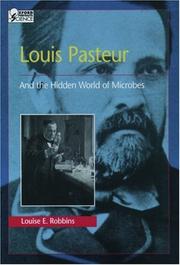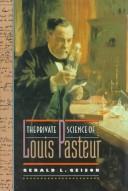| Listing 1 - 4 of 4 |
Sort by
|

ISBN: 1280603070 9786610603077 0198028547 1423742001 9780198028543 0195122275 Year: 2001 Publisher: New York : Oxford University Press,
Abstract | Keywords | Export | Availability | Bookmark
 Loading...
Loading...Choose an application
- Reference Manager
- EndNote
- RefWorks (Direct export to RefWorks)
Scientists --- Microbiologists --- Microbiologists. --- Scientists. --- Professional employees --- Biologists --- Pasteur, Louis, --- Paster, Lui, --- Pa-xtʼ, Lu-i, --- Pasteur, --- פסטר, לואי --- Pasteur, L. --- Pasteur, Luis,

ISBN: 0691034427 1306984459 0691604975 0691633975 069101552X 1400864089 9781400864089 9780691034423 9780691604978 Year: 1995 Publisher: Princeton, New Jersey
Abstract | Keywords | Export | Availability | Bookmark
 Loading...
Loading...Choose an application
- Reference Manager
- EndNote
- RefWorks (Direct export to RefWorks)
In The Private Science of Louis Pasteur, Gerald Geison has written a controversial biography that finally penetrates the secrecy that has surrounded much of this legendary scientist's laboratory work. Geison uses Pasteur's laboratory notebooks, made available only recently, and his published papers to present a rich and full account of some of the most famous episodes in the history of science and their darker sides--for example, Pasteur's rush to develop the rabies vaccine and the human risks his haste entailed. The discrepancies between the public record and the "private science" of Louis Pasteur tell us as much about the man as they do about the highly competitive and political world he learned to master. Although experimental ingenuity served Pasteur well, he also owed much of his success to the polemical virtuosity and political savvy that won him unprecedented financial support from the French state during the late nineteenth century. But a close look at his greatest achievements raises ethical issues. In the case of Pasteur's widely publicized anthrax vaccine, Geison reveals its initial defects and how Pasteur, in order to avoid embarrassment, secretly incorporated a rival colleague's findings to make his version of the vaccine work. Pasteur's premature decision to apply his rabies treatment to his first animal-bite victims raises even deeper questions and must be understood not only in terms of the ethics of human experimentation and scientific method, but also in light of Pasteur's shift from a biological theory of immunity to a chemical theory--similar to ones he had often disparaged when advanced by his competitors. Through his vivid reconstruction of the professional rivalries as well as the national adulation that surrounded Pasteur, Geison places him in his wider cultural context. In giving Pasteur the close scrutiny his fame and achievements deserve, Geison's book offers compelling reading for anyone interested in the social and ethical dimensions of science. Originally published in 1995.The Princeton Legacy Library uses the latest print-on-demand technology to again make available previously out-of-print books from the distinguished backlist of Princeton University Press. These editions preserve the original texts of these important books while presenting them in durable paperback and hardcover editions. The goal of the Princeton Legacy Library is to vastly increase access to the rich scholarly heritage found in the thousands of books published by Princeton University Press since its founding in 1905.
Rhabdoviridae Infections --- Primary Prevention --- Biography as Topic --- -Disease Attributes --- Animal Experimentation --- Retrospective Moral Judgment --- Immunization --- Therapeutic Human Experimentation --- Animal Welfare --- Famous Persons --- Terminally Ill --- Research Personnel --- Iatrogenic Disease --- Research Subjects --- Rabies --- Pasteur, Louis, --- Paster, Lui, --- Pa-xtʼ, Lu-i, --- Pasteur, --- פסטר, לואי --- Pasteur, L. --- Pasteur, Luis, --- Scientists --- Biography. --- Biographies. --- Medical atlases, portraits, iconography. --- Medical research incl. research institutes, foundations. --- Scientifiques --- Biography --- Biographies --- France --- Pasteur, Louis, - 1822-1895. --- Scientists - France - Biography. --- Pasteur, louis (1822-1895) --- Chercheurs scientifiques --- Biographie
Book
ISBN: 1281603651 9786613784346 9814397342 9789814397346 9781281603654 9789814397339 9814397334 Year: 2012 Publisher: Hackensack, N.J. : World Scientific,
Abstract | Keywords | Export | Availability | Bookmark
 Loading...
Loading...Choose an application
- Reference Manager
- EndNote
- RefWorks (Direct export to RefWorks)
This book aims to describe, for readers uneducated in science, the development of humanity's desire to know and understand the world around us through the various stages of its development to the present, when science is almost universally recognized - at least in the Western world - as the most reliable way of knowing. The book describes the history of the large-scale exploration of the surface of the earth by sea, beginning with the Vikings and the Chinese, and of the unknown interiors of the American and African continents by foot and horseback. After the invention of the telescope, visual
Scientists --- Darwin, Charles, --- Mendel, Gregor, --- Pasteur, Louis, --- Faraday, Michael, --- Planck, Max, --- Fermi, Enrico, --- Fermi, Enriko, --- Faraday, M. --- Faradeĭ, Mikhail, --- Faradeĭ, Maĭkŭl, --- Fa-la-ti, --- פאראדײ, מ. --- Faradeĭ, Maĭkl, --- Фарадей, Майкл, --- Paster, Lui, --- Pa-xtʼ, Lu-i, --- Pasteur, --- פסטר, לואי --- Pasteur, L. --- Pasteur, Luis, --- Mendel, Johann Gregor, --- Mendel, Gregor Johann, --- Mendel, Rehor Jan, --- Mendel, J. G. --- Meng-te-erh, --- Darwin, Charles, Robert --- 5/6 <09> --- Geschiedenis van de exacte en toegepaste wetenschappen --- Mendel, G. --- Mendel, Gregorius Joannes, --- Mendel, Řehoř Jan,
Book
ISBN: 0190072822 0190072857 0190072830 9780190072827 Year: 2020 Publisher: Oxford Oxford university press
Abstract | Keywords | Export | Availability | Bookmark
 Loading...
Loading...Choose an application
- Reference Manager
- EndNote
- RefWorks (Direct export to RefWorks)
Pasteur's Empire shows how the scientific prestige of the Pasteur Institute came to depend on its colonial laboratories, and how, conversely, the institutes themselves became central to colonial politics. This book argues that decisions as small as the isolation of a particular yeast or the choice of a laboratory animal could have tremendous consequences on the lives of Vietnamese and African subjects, who became the consumers of new vaccines or industrially fermented intoxicants. Simultaneously, global forces, such as the rise of international standards and American competitors pushed Pastorians to their imperial laboratories, where they could conduct studies that researchers in France considered too difficult or controversial. Chapters follow not just Alexandre Yersin's studies of the plague, Charles Nicolle's public health work in Tunisia, and Jean Laigret's work on yellow fever in Dakar, but also the activities of Vietnamese doctors, African students and politicians, Syrian traders, and Chinese warlords. It argues that a specifically Pastorian understanding of microbiology shaped French colonial politics across the world, allowing French officials to promise hygienic modernity while actually committing to little development. In bringing together global history, imperial history, and science and technology studies, Pasteur's Empire deftly integrates micro and macro analyses into one connected narrative that sheds critical light on a key era in the history of medicine.
Bacteriology --- Medical laboratories --- Imperialism and science --- Science and imperialism --- Science --- Diagnosis, Laboratory --- Health facilities --- Laboratories --- Microbiology --- History --- Pasteur, Louis, --- Paster, Lui, --- Pa-xtʼ, Lu-i, --- Pasteur, --- פסטר, לואי --- Pasteur, L. --- Pasteur, Luis, --- Institut Pasteur (Paris, France) --- Pasteur Institute (Paris, France) --- Société française de microbiologie. --- France --- Bro-C'hall --- Fa-kuo --- Fa-lan-hsi --- Faguo --- Falanxi --- Falanxi Gongheguo --- Faransā --- Farānsah --- França --- Francia (Republic) --- Francija --- Francja --- Francland --- Francuska --- Franis --- Franḳraykh --- Frankreich --- Frankrig --- Frankrijk --- Frankrike --- Frankryk --- Fransa --- Fransa Respublikası --- Franse --- Franse Republiek --- Frant︠s︡ --- Frant︠s︡ Uls --- Frant︠s︡ii︠a︡ --- Frantsuzskai︠a︡ Rėspublika --- Frantsyi︠a︡ --- Franza --- French Republic --- Frencisc Cynewīse --- Frenska republika --- Furansu --- Furansu Kyōwakoku --- Gallia --- Gallia (Republic) --- Gallikē Dēmokratia --- Hyãsia --- Parancis --- Peurancih --- Phransiya --- Pransiya --- Pransya --- Prantsusmaa --- Pʻŭrangsŭ --- Ranska --- República Francesa --- Republica Franzesa --- Republika Francuska --- Republiḳah ha-Tsarfatit --- Republikang Pranses --- République française --- Tsarfat --- Tsorfat --- Γαλλική Δημοκρατία --- Γαλλία --- Франц --- Франц Улс --- Французская Рэспубліка --- Францыя --- Франция --- Френска република --- פראנקרייך --- צרפת --- רפובליקה הצרפתית --- فرانسه --- فرنسا --- フランス --- フランス共和国 --- 法国 --- 法蘭西 --- 法蘭西共和國 --- 프랑스 --- France (Provisional government, 1944-1946) --- Colonies --- Bacteriology. --- French colonies. --- Imperialism and science. --- Medical laboratories. --- History. --- 1800-1899 --- France. --- Institut Pasteur de Paris
| Listing 1 - 4 of 4 |
Sort by
|

 Search
Search Feedback
Feedback About
About Help
Help News
News